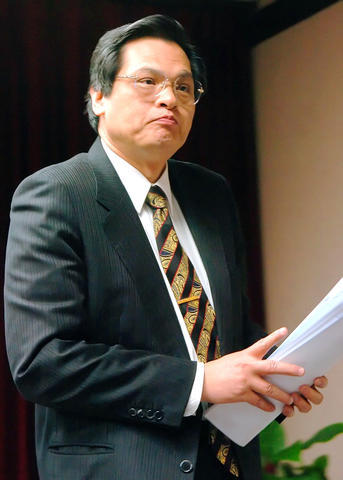China's "Anti-Secession" Law en-acted in 2005 unquestionably destroyed the mechanisms for improving cross-strait relations Mainland Affairs Council Chairman Chen Ming-tong (陳明通) said yesterday.
Two communiques signed between Beijing and two pan-blue leaders later that year further im-peded Taiwan's struggle for independence, he said.
The"Anti-Secession" Law, passed in China on March 14, 2005, authorized the Chinese military to take Taiwan via "non-peaceful" means if Taiwan makes moves towards de jure independence.

PHOTO: CHU PEI-HSIUNG, TAIPEI TIMES
Chen yesterday blasted the law, along with the two communiques signed by former Chinese Nationalist Party (KMT) chairman Lien Chan (
The two communiques, namely the agreements signed between Lien and Chinese President Hu Jin-tao (胡錦濤) in April 2005 and another signed between Hu and Soong later that year, all carried strong pro-unification undertones that gave a thumbs-up to the so called "one-China" principle, Chen said.
"Although the KMT, being the opposition party at the time, had no legal authority to sign any agreements on behalf of the government, the passage of the law and the signing of the communiques has since become the trammel of Taiwan's fate," Chen said.
He condemned the communiques as appendages to the "Anti-Secession" Law that give Beijing more ground to strangle Taiwan's standing in internationally.
The communiques not only failed to recognize "one-China, two interpretations," they also function like a dummy company to help China "smuggle" in its "one-China" principle that would eventually sell out Taiwan's sovereignty, he said.
For example, he said, after signing the communiques, Hu has on numerous occasions cited them as justification to claim Taiwan as part of the "motherland."
Chen also chastised Beijing's "two-faced approach" of giving Taiwanese businessmen economic sweeteners while increasing the number of missiles pointing at Taiwan.
MAC Vice-chairman Liu Teh-hsun (劉德勳) pointed out Article five of the law -- often overlooked by critics -- which stipulates that Taiwan would only be allowed to exist under a "high degree of autonomy after reunification."
"The vision of the future should be better than the current reality. How is a `high-degree of autonomy' a better offer than what Taiwan has right now?" he said, adding that if China was sincere, it should offer Taiwan something lucrative enough for it to be willing to change its status.
Meanwhile, in related news, President Chen Shui-bian (陳水扁) warned in an interview published yesterday that China would never stop intimidating and harassing Taiwan regardless of who wins the presidential election next weekend.
Chen said China would have already "taken" Taiwan if he had not upheld its sovereignty during the past eight years.
"You think that when a certain person assumes power, a certain party comes into power, China will change its ambition, intention and preparations to annex Taiwan?" Chen told the Financial Times.
ADDITIONAL REPORTING BY AFP

A preclearance service to facilitate entry for people traveling to select airports in Japan would be available from Thursday next week to Feb. 25 at Taiwan Taoyuan International Airport, Taoyuan International Airport Corp (TIAC) said on Tuesday. The service was first made available to Taiwanese travelers throughout the winter vacation of 2024 and during the Lunar New Year holiday. In addition to flights to the Japanese cities of Hakodate, Asahikawa, Akita, Sendai, Niigata, Okayama, Takamatsu, Kumamoto and Kagoshima, the service would be available to travelers to Kobe and Oita. The service can be accessed by passengers of 15 flight routes operated by

MORE FALL: An investigation into one of Xi’s key cronies, part of a broader ‘anti-corruption’ drive, indicates that he might have a deep distrust in the military, an expert said China’s latest military purge underscores systemic risks in its shift from collective leadership to sole rule under Chinese President Xi Jinping (習近平), and could disrupt its chain of command and military capabilities, a national security official said yesterday. If decisionmaking within the Chinese Communist Party has become “irrational” under one-man rule, the Taiwan Strait and the regional situation must be approached with extreme caution, given unforeseen risks, they added. The anonymous official made the remarks as China’s Central Military Commission Vice Chairman Zhang Youxia (張又俠) and Joint Staff Department Chief of Staff Liu Zhenli (劉振立) were reportedly being investigated for suspected “serious

Taiwanese and US defense groups are collaborating to introduce deployable, semi-autonomous manufacturing systems for drones and components in a boost to the nation’s supply chain resilience. Taiwan’s G-Tech Optroelectronics Corp subsidiary GTOC and the US’ Aerkomm Inc on Friday announced an agreement with fellow US-based Firestorm Lab to adopt the latter’s xCell, a technology featuring 3D printers fitted in 6.1m container units. The systems enable aerial platforms and parts to be produced in high volumes from dispersed nodes capable of rapid redeployment, to minimize the risk of enemy strikes and to meet field requirements, they said. Firestorm chief technology officer Ian Muceus said

Alain Robert, known as the "French Spider-Man," praised Alex Honnold as exceptionally well-prepared after the US climber completed a free solo ascent of Taipei 101 yesterday. Robert said Honnold's ascent of the 508m-tall skyscraper in just more than one-and-a-half hours without using safety ropes or equipment was a remarkable achievement. "This is my life," he said in an interview conducted in French, adding that he liked the feeling of being "on the edge of danger." The 63-year-old Frenchman climbed Taipei 101 using ropes in December 2004, taking about four hours to reach the top. On a one-to-10 scale of difficulty, Robert said Taipei 101